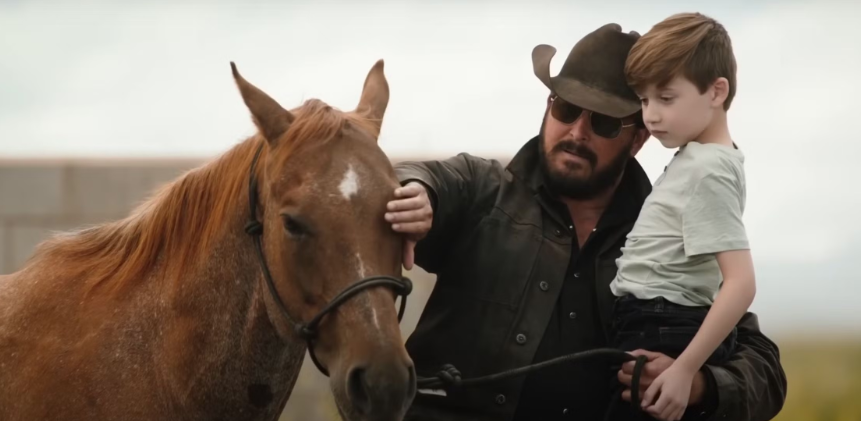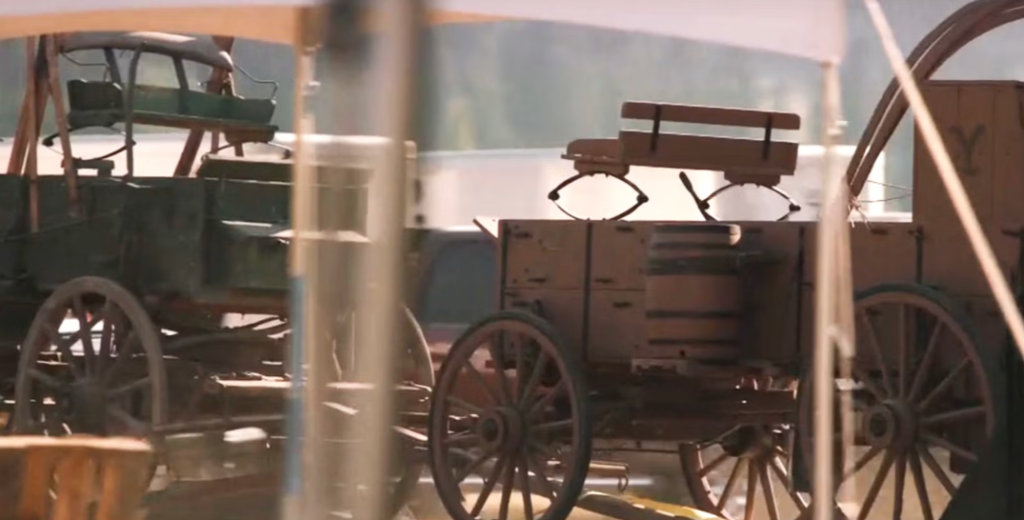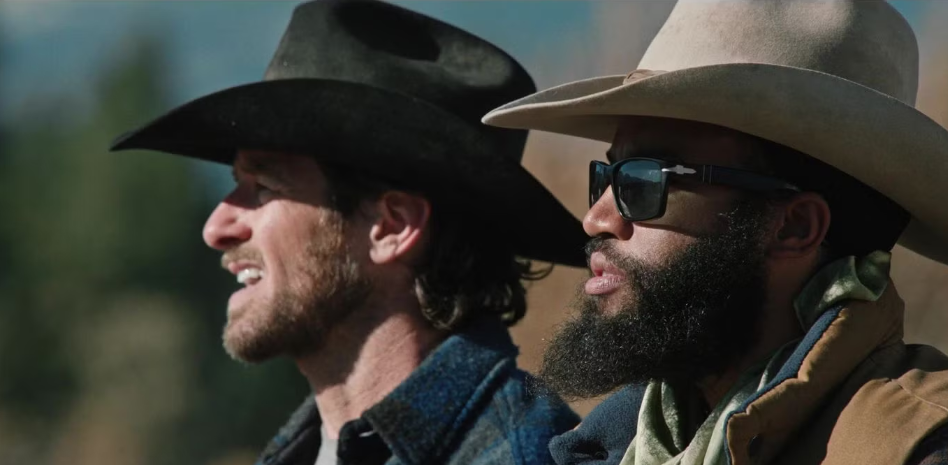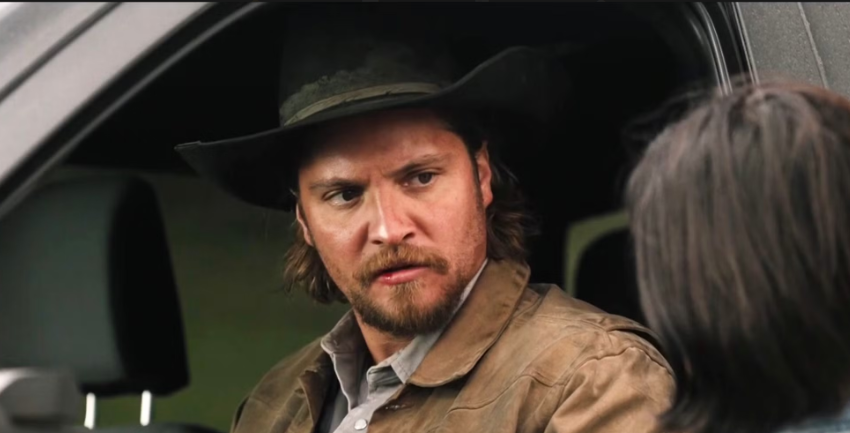Quick Summary
The Dutton Ranch prophecy, originating from 1883, suggests that in seven generations, the land once settled by the Dutton family will be returned to the Native American people. In Yellowstone season 5, episode 13, Kayce Dutton hints at giving away the ranch, making the prophecy’s fulfillment more likely. This potential ending could signify a powerful shift in the show’s narrative, offering justice to the Native American community and providing a fitting closure to the Dutton family’s saga.
The world of Yellowstone is filled with powerful legacies, family drama, and unexpected twists. But Season 5, Episode 13 takes things to a whole new level by bringing a long-standing prophecy into the spotlight. This prophecy, which dates back to the events in 1883, has always loomed over the Dutton family, hinting at a future that could radically change the course of the ranch. In this post, we’ll dive deep into this prophecy, explore how Episode 13 makes it more likely to come true, and discuss why the return of the Dutton Ranch to Native American hands could be the most fitting and powerful ending for the series.
Understanding the Dutton Ranch Prophecy in Yellowstone and 1883
What is the Dutton Ranch Prophecy?
The Dutton Ranch prophecy is first introduced in 1883, during the journey of James and Margaret Dutton and their children, Elsa and John, as they travel from Texas to Montana in search of a new life. During their travels, they meet a Crow Elder named Spotted Eagle, who shares a foreboding prophecy with James. According to the Elder, in seven generations, the land that the Dutton family has settled on—the Paradise Valley, which is sacred to the Crow people—will be returned to them. In essence, the prophecy suggests that the Dutton family will ultimately relinquish the land they have fought to claim, and it will once again belong to its Indigenous people.
Key points:
- The prophecy is tied to the Dutton family’s settlement in the Paradise Valley.
- The Crow Elder predicts that, in seven generations, the land will be reclaimed by the Indigenous people.
- James Dutton’s response to the prophecy is significant—he is willing to let the land go if the time comes.
This moment in 1883 sets the stage for the unfolding events in Yellowstone, where the Dutton family’s relationship with the land—and with the Indigenous tribes of Montana—becomes more complicated and intertwined. The prophecy has been a lingering presence throughout the series, and many fans have speculated on how it might play out.
How Does the Prophecy Connect to the Events in Yellowstone?
The connection between the prophecy in 1883 and Yellowstone is unmistakable. Throughout Yellowstone, the Dutton family has struggled to hold onto their ranch, fighting against both legal and violent forces that want to take it from them. From land developers to politicians, the Duttons have faced constant pressure to sell or leave. Yet, despite all the challenges, the family has remained fiercely protective of their land.
However, as the series progresses, particularly in Season 5, Episode 13, it becomes clear that the prophecy’s influence is not a distant memory. Instead, it feels more like an inevitable future for the Duttons. The prophecy isn’t just a piece of history; it’s a guiding force that could reshape the family’s destiny. The Duttons’ efforts to control the ranch might come to an end, leading to a new chapter for the land—and for the people who have long called it home.
Why Is the Prophecy So Important for the Dutton Family?
The prophecy holds immense significance for the Duttons, particularly for characters like Kayce, who are grappling with their own roles within the family and their relationships to the land. Kayce’s journey, in particular, is intertwined with the idea of inheritance, responsibility, and the weight of past decisions. If the prophecy comes true, it would represent not only the end of the Dutton family’s reign over the ranch but also a profound transformation in the way the family relates to the land they’ve fought so hard to protect.
For the Duttons, fulfilling the prophecy would be an act of redemption, returning the land to the Indigenous people it was originally taken from. It would also serve as a poignant acknowledgment of the mistakes of the past and a step toward healing, both for the Duttons and for the Native communities they have historically wronged.




The Clues in Yellowstone Season 5, Episode 13 That Make the Prophecy More Likely
What Happens in Yellowstone Season 5, Episode 13?
In Yellowstone Season 5, Episode 13, titled “Give the World Away,” a major turning point occurs that brings the Dutton Ranch prophecy into sharp focus. Beth Dutton, the family’s fiery and pragmatic daughter, is tasked with auctioning off everything on the ranch in an attempt to buy her siblings more time. This moment, while emotionally charged, sets the stage for Kayce to reveal a plan that suggests the ranch might not remain in Dutton hands for much longer.
Kayce, who has always been deeply connected to the land and the Indigenous people, takes a more significant role in the episode’s events. He proposes the idea of giving the ranch away, asking Beth a hypothetical question about selling something for $1. While the specifics of his plan are not revealed immediately, it becomes clear that Kayce is serious about giving up the ranch, potentially returning it to its rightful owners.
Key moments from the episode:
- Beth auctions off the ranch, trying to buy more time for the family.
- Kayce hints at giving the ranch away for a symbolic price—$1.
- Kayce seems to have a particular recipient in mind for the land, leading fans to believe he could be planning to return the ranch to the Indigenous people.
Kayce’s Plan: Giving the Ranch Away?
Kayce’s subtle hints in Episode 13 raise the possibility that he is planning to give away the ranch, and not to just anyone. In a tense conversation with Beth, he asks her what would happen if he bought her $300,000 car for just $1. This hypothetical question serves as a clue, suggesting that Kayce is considering giving the ranch away for a token amount, signaling that the family might no longer have control over the land.
Beth, though skeptical, seems to catch on to Kayce’s plan. She asks, “Who would you sell it to?” showing that she knows the ranch is going to someone else. Kayce smiles and promises to give her an answer soon, leaving viewers to wonder if he has a specific person in mind.
This moment in the episode is a crucial turning point. It’s not just about saving the ranch—it’s about potentially fulfilling the prophecy and giving the land back to the Broken Rock tribe, whom Kayce has grown closer to over the years.
What Is Kayce’s Connection to the Broken Rock Tribe?
Kayce’s relationship with the Broken Rock tribe has developed significantly over the course of the series. His close friendship with Mo Brings Plenty (a member of the tribe) and his increasing involvement in tribal matters show that he has come to understand the importance of the land to the Indigenous people. In fact, in earlier seasons of Yellowstone, Kayce threatens to “count coup” on someone who wrongs the tribe, a symbol of his growing loyalty and alliance with them.
By the end of Season 5, Episode 13, it’s clear that Kayce is not just considering giving away the ranch for the sake of his family—he might be planning to return it to the Native people, just as the prophecy predicted. This would fulfill the promise made by James Dutton in 1883 and bring a sense of closure to the Dutton family’s long history of conflict over the land.
Why the Return of the Ranch to the Native People Could Be a Fitting Ending for Yellowstone
The Impact of Displacing Indigenous People in American History
For centuries, the Western United States has been a battleground where Indigenous communities were forcibly displaced to make way for settlers. The Duttons’ story, which spans generations, is a microcosm of this larger historical tragedy. By returning the ranch to the Native people, Yellowstone can address the sins of the past and acknowledge the injustices that occurred when settlers like the Duttons claimed land that rightfully belonged to Indigenous tribes.
The return of the ranch would be more than just a symbolic gesture—it would be a powerful acknowledgment of the damage done by Western expansion and the centuries-long struggle of Native American communities to regain control of their land. For many fans, this act would represent the culmination of a storyline that has long been about redemption, healing, and reconciliation.
Key points to consider:
- Western expansion led to the displacement of Indigenous communities across the U.S.
- The Dutton family’s ownership of the ranch has been a source of tension throughout Yellowstone.
- Returning the ranch to Native people would be a meaningful and redemptive act for both the Duttons and the Broken Rock tribe.
The Symbolism of Returning the Ranch to the Broken Rock Tribe
Returning the ranch to the Broken Rock tribe would not only fulfill the prophecy but also bring a sense of balance to the land. It would represent a return to the natural order, where the Indigenous people once again hold dominion over the land that was stolen from them.
The Broken Rock tribe, led by Chairman Thomas Rainwater (Gil Birmingham), has played a central role in the series as a voice of resistance against the Duttons’ control of the land. Throughout the show, Thomas Rainwater has sought to reclaim the land for his people, and Kayce’s decision to hand over the ranch could serve as the final, climactic act of the series—a moment of reconciliation and justice for Native Americans.
The Role of Kayce in Restoring Balance to the Land
Kayce Dutton, once a soldier and a man torn between his loyalty to his family and his connection to the land, is now the key figure in restoring balance to the Dutton Ranch. His growing bond with the Broken Rock tribe and his understanding of the deep ties between the land and its original inhabitants make him the ideal person to fulfill the prophecy. In many ways, Kayce’s journey has been one of redemption and acceptance, and returning the ranch to the Native people would serve as the ultimate expression of his growth as a character.
How Yellowstone Challenges Traditional Western Narratives and Representation
Redefining the Western Genre
The Yellowstone series, while embracing many traditional Western tropes—wide-open landscapes, cowboy culture, and epic battles for land—also challenges and subverts these conventions in significant ways. One of the key elements in this subversion is how the show portrays Native American characters and their relationships to land, power, and legacy.
In most classic Westerns, Native American characters were often relegated to the role of “savages” or “noble savages,” and their perspectives were largely ignored or misrepresented. However, Yellowstone flips this narrative. Native American characters, particularly Chairman Thomas Rainwater and Mo Brings Plenty, are given complex backstories, motivations, and agency. The show doesn’t simply depict Native American struggles as something from the past—it shows them as ongoing battles for justice, land, and identity.
By doing this, Yellowstone challenges the traditional one-dimensional portrayal of Indigenous people in Westerns. The show has become a platform for deeper conversations about the history of colonization, the long-standing effects of land displacement, and the struggle for self-determination.
Key points:
- Yellowstone offers more nuanced, complex representations of Native American characters.
- The show confronts historical injustices surrounding land rights and sovereignty.
- By giving Native American characters a prominent voice, Yellowstone redefines the Western genre.
Breaking Stereotypes and Giving Indigenous People a Voice
Another critical way Yellowstone challenges traditional Western narratives is by giving voice to Indigenous characters like Thomas Rainwater and Mo Brings Plenty. Rather than being sidelined or demonized as in many older Westerns, these characters are portrayed as leaders, advocates, and active participants in shaping the future of their communities.
Rainwater’s character, in particular, is portrayed as a highly educated, politically savvy individual who has worked tirelessly to reclaim land for his people. His goal isn’t just to take back what was stolen, but to restore dignity, sovereignty, and a sense of community. His leadership represents a powerful inversion of the typical portrayal of Native Americans as either passive victims or hostile antagonists in Western films.
Important takeaway:
- Native American characters in Yellowstone are fully fleshed out and presented with agency, depth, and complexity.
What Could This Prophecy Mean for the Future of Yellowstone and Its Characters?
Potential Endings for the Duttons: A New Era or the End of an Empire?
The Dutton Ranch prophecy presents the possibility that the land will eventually be returned to the Native people, fulfilling the long-predicted return of the ranch. But what does this mean for the future of the show and its characters, especially the Duttons?
For John Dutton, the patriarch, and his family, this could represent the culmination of years of fighting to protect the ranch. If the prophecy comes true, it would not only end the Dutton family’s hold on the land but could also serve as a moment of redemption for the characters. The Duttons’ journey has been defined by their struggle to retain control over the ranch, but by returning it to the Native people, they could finally be freed from that burden—potentially bringing an end to the Dutton legacy as we know it.
Kayce Dutton’s role in this potential shift is crucial. As the most spiritually connected Dutton to the land and the Native community, Kayce could play a pivotal role in returning the ranch to its rightful owners, bringing a sense of closure to the family’s ongoing battle. His decision could act as a redemptive act, closing the chapter on a century-old history of settler colonialism and giving the land back to its original stewards.
A Shift in the Power Dynamics: Land Ownership as a Symbol of Justice
The prophecy also opens up the possibility for Yellowstone to explore the changing dynamics of power, particularly with regard to land ownership. The show could use this transition to tackle contemporary issues surrounding land, power, and wealth, such as how the Dutton family’s empire might collapse in the face of a return to Indigenous sovereignty.
For the Duttons, this could represent not just a literal loss of land, but also the crumbling of their family dynasty. For the Native American characters, it could symbolize the restoration of dignity, justice, and rightful ownership of the land that was once taken from them.
Key points:
- Returning the ranch to Native people could symbolize the end of the Dutton legacy.
- The prophecy could be a mechanism for exploring power, justice, and land ownership.
- Kayce’s actions will be central to how the prophecy plays out and how the story ends.
What Fans Are Saying About the Dutton Ranch Prophecy and Its Potential End
Fans’ Reactions: Mixed Emotions and Theories
As Yellowstone fans eagerly await the resolution of the prophecy, there has been a flurry of theories and speculation about how the show will ultimately end. Many fans believe that the return of the Dutton Ranch to the Native people would be a fitting and powerful conclusion to the series. Some fans see it as a redemption arc for the Duttons, a way to right historical wrongs and give back what was stolen.
Others, however, are more skeptical. The Duttons have spent years building their empire, and the idea of them simply giving it away to the Native people is a huge departure from the show’s established narrative. Some fans worry that this would mark a betrayal of everything the Duttons have fought for throughout the series, while others fear that it would signify the end of a family legacy that has been at the heart of Yellowstone.
Key fan theories include:
- Kayce Dutton will be the one to fulfill the prophecy and give the ranch back to the Broken Rock tribe.
- The Duttons might eventually accept their loss of the land and find a new purpose, allowing the Native people to reclaim what’s rightfully theirs.
- Some fans believe the prophecy could lead to a dramatic confrontation between the Duttons and the Broken Rock tribe.
Regardless of how fans feel about it, the prophecy has sparked intense conversation and has kept Yellowstone fans hooked on the show’s evolving narrative.
Conclusion: The Prophecy’s Role in Shaping Yellowstone’s Legacy
A Story of Redemption, Healing, and Justice
The Dutton Ranch prophecy has been a crucial element in the storytelling of Yellowstone, providing a sense of foreboding and anticipation throughout the series. If the prophecy comes true, it would represent a powerful moment of redemption for both the Duttons and the Native American characters. It would allow the show to address the complex history of land theft and provide a sense of closure and justice for the Indigenous people of Montana.
Whether or not the prophecy ultimately comes to pass, its presence in Yellowstone serves as a reminder of the deeper, more profound themes at play in the show. It challenges traditional Western narratives, offers more complex portrayals of Native American characters, and provides an opportunity for healing and reconciliation.
As the series draws toward its conclusion, the prophecy may very well provide the perfect resolution, one that ties together the Dutton family’s story and the struggles of the Native communities in a way that feels both meaningful and cathartic.
Frequently Asked Questions
1. What is the Dutton Ranch prophecy in Yellowstone?
The Dutton Ranch prophecy originates from 1883, when the Dutton family’s ancestor, James Dutton, encounters a Crow Elder named Spotted Eagle. The Elder tells James that, in seven generations, the land the Duttons settle will be taken back by Native American people. This prophecy is a central theme in Yellowstone as it suggests the eventual return of the land to its original Indigenous stewards.
2. How does Yellowstone season 5, episode 13 support the prophecy?
In Yellowstone season 5, episode 13, Kayce Dutton hints at giving the family ranch away. He discusses selling something for $1, suggesting that the ranch could potentially be sold or given to someone else—most likely the Native American community. This episode strengthens the possibility that the prophecy will come true, as Kayce is shown to be considering returning the land to the Broken Rock tribe.
3. Why is the Dutton Ranch prophecy important for the show’s ending?
The Dutton Ranch prophecy offers a potential resolution to the show’s long-running themes of land ownership, legacy, and justice. If the Duttons return the ranch to the Native people, it would signify a major shift in power dynamics, while also providing a sense of redemption and healing for both the Dutton family and Indigenous communities. It allows Yellowstone to address historical wrongs and bring closure to the story of the ranch.
4. What does the return of the Dutton Ranch to the Native people symbolize?
The return of the Dutton Ranch to the Native people would symbolize the reclamation of stolen land and a step toward justice and reconciliation. It challenges traditional Western narratives where Indigenous people are often depicted as victims or antagonists. In this case, the ranch’s return would be a powerful moment of empowerment for the Native American community in the context of the show.
5. How does Yellowstone challenge traditional Western narratives?
Yellowstone subverts traditional Western storytelling by providing complex, nuanced portrayals of Native American characters. Instead of relegating Indigenous people to the role of “savages” or mere background characters, Yellowstone gives them significant roles in the storyline, advocating for their rights, land, and identity. The show brings attention to the impact of colonization and the long-lasting consequences for Indigenous communities.
6. Will Kayce Dutton play a key role in fulfilling the prophecy?
Yes, Kayce Dutton is positioned as a key character in the potential fulfillment of the prophecy. He has a strong connection to both the land and the Native American community, and his willingness to give the ranch away suggests that he may be the one to return the land to the Broken Rock tribe. His actions could serve as a redemptive act, both for his family and for the Native community.
7. How have fans reacted to the Dutton Ranch prophecy?
Fans have had mixed reactions to the Dutton Ranch prophecy. Many believe it would be a fitting and powerful conclusion to the series, bringing closure to the Dutton family’s struggle and providing justice to the Native American characters. Others are more skeptical, fearing it could be a betrayal of everything the Duttons have fought for. Regardless, the prophecy has sparked significant discussion and speculation among Yellowstone fans.
8. What could the end of Yellowstone mean for the Dutton family?
The end of Yellowstone could represent the closure of the Dutton family’s saga, especially if the prophecy is fulfilled and they are forced to give up the ranch. This could mark the end of their control over the land and signify the end of their legacy. However, it could also offer a sense of redemption and freedom, allowing the Duttons to move beyond their history of violence and power struggles, and perhaps even heal from their tumultuous past.
Author’s Note
As fans of Yellowstone, we’ve all been captivated by the complex family dynamics, the stunning Montana landscapes, and the deep-rooted themes of power, legacy, and justice. The Dutton Ranch prophecy, with its ties to historical injustices and its potential to reshape the future of the Dutton family, is one of the most intriguing plot points that Taylor Sheridan has woven into the fabric of the show. This article is an attempt to dive deep into the meaning of this prophecy, its significance within the context of Yellowstone, and how it could potentially alter the future of the series and its characters.
The journey that the Dutton family has been on—both literally and figuratively—has always been a reflection of the larger struggles between Native American communities and the settlers who claimed their land. As we look ahead to the possible conclusion of Yellowstone, the return of the Dutton Ranch to its original Indigenous inhabitants would be an emotional and powerful way to tie up the show’s ongoing narrative about land, ownership, and the impact of colonialism.
I hope this exploration not only gives you a deeper understanding of what the prophecy means for Yellowstone, but also offers insight into the broader themes the show addresses—issues that continue to shape our real-world conversations about history, identity, and justice. Whether you agree or disagree with the potential outcome, there’s no doubt that Sheridan has created a show that forces us to reconsider who truly owns the land and what that ownership means for the future.
Thank you for reading and sharing in this exploration of the Dutton Ranch prophecy with me. Let’s keep the conversation going—feel free to share your thoughts on the topic, and don’t forget to stay tuned as Yellowstone continues to evolve.
By SSonko David
Ssonko David is a skilled entertainment news writer with a wealth of experience spanning over four years in the industry. Having collaborated with several reputable media outlets, David combines his extensive knowledge with a genuine passion for storytelling to create engaging and insightful articles.
About Patoga Nation
Patoga Nation Inc. is a leading digital media platform founded in 2020, dedicated to delivering unparalleled insight, analysis, and news in the entertainment, gaming, and pop culture industries.
Editorial Standards
At Patoga Nation Inc. (“Patoga Nation”), we are deeply committed to producing high-quality, accurate, and universally beneficial content that resonates with integrity and credibility. Our editorial standards reflect our mission to inform, engage, and empower our audience across diverse topics, from breaking news to in-depth guides, reviews, opinion pieces, and features.
